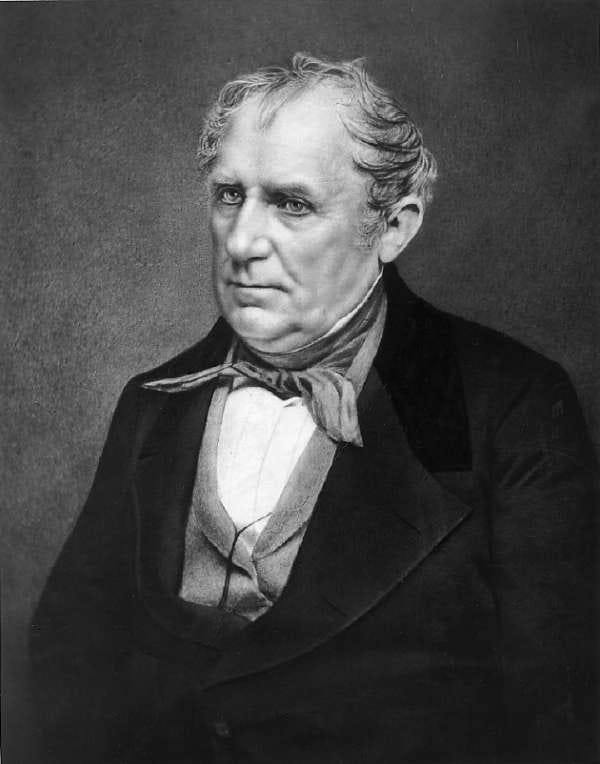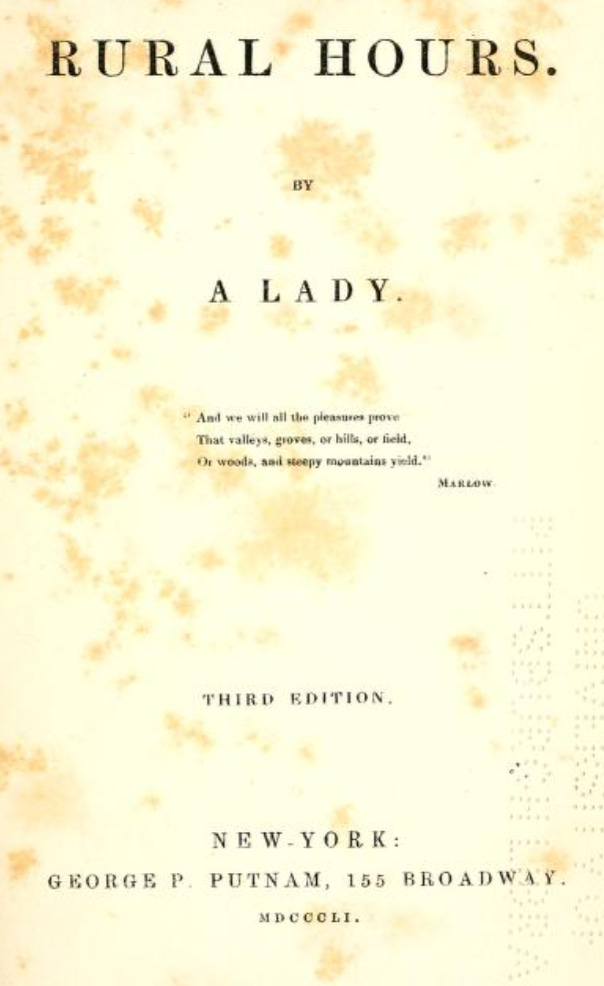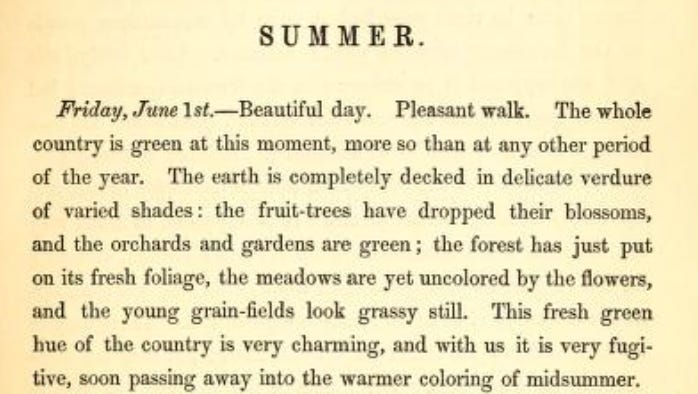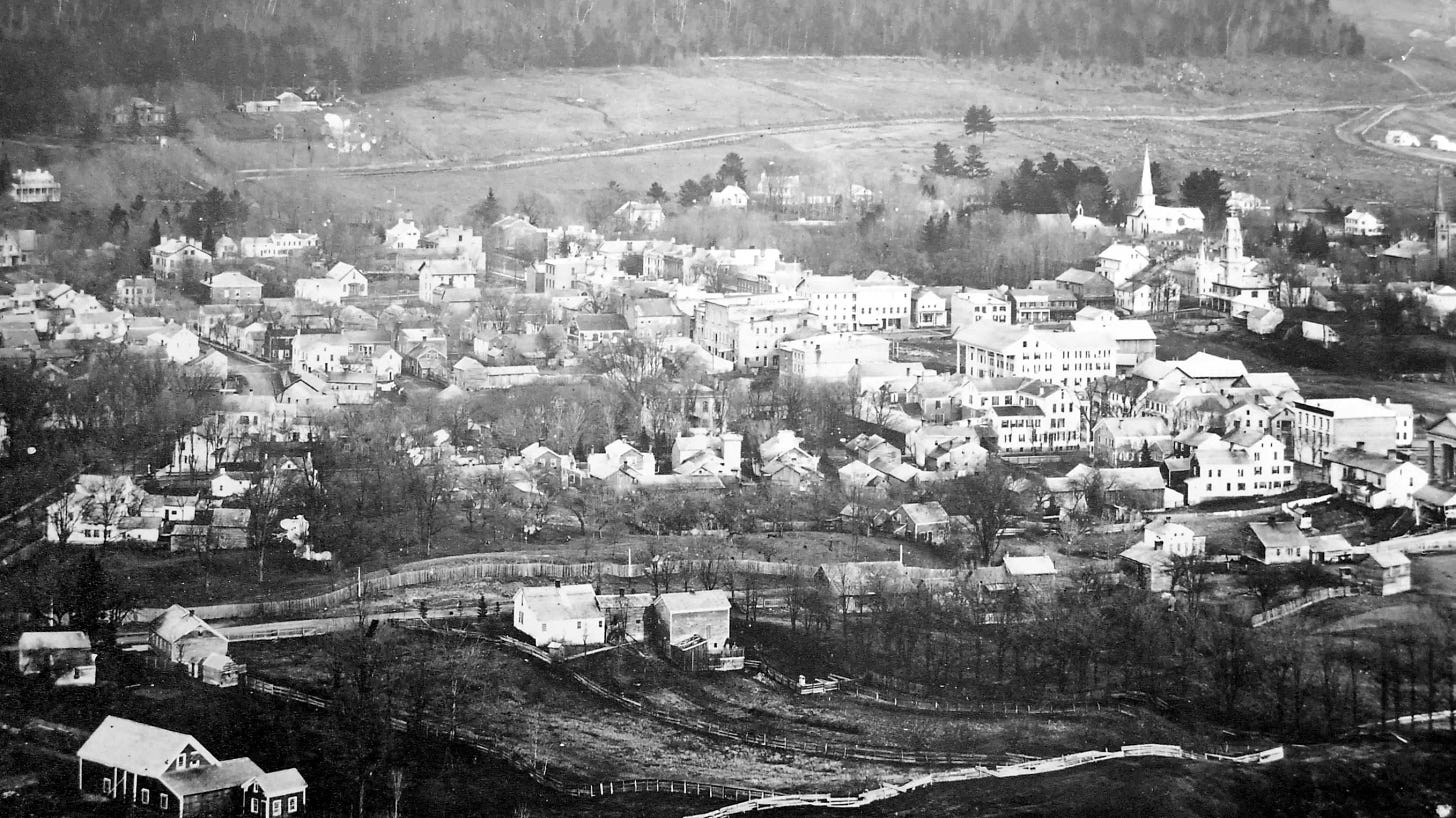Contemplating Change and the Virtues of Gardens and Forests
"Summer" in Susan Fenimore Cooper's Rural Hours (1850)
This week’s turn of the dial lands on The Library again. Back in March, around the equinox, I devoted space here to Susan Fenimore Cooper’s Rural Hours, an 1850 classic in American nature writing. I figured then that it would be a good text to return to around the solstice, too. By the end of the year, I’ll finish the book. Here are some observations about summer across more than 17 decades. Read on!
Refresher
A quick recap to contextualize Cooper and her book.
Cooper’s father was James Fenimore Cooper whose Leatherstocking Tales chronicled the “frontier” and helped him become a successful author. Cooper’s grandfather, William Cooper, founded Cooperstown, New York, home of the National Baseball Hall of Fame and Museum. (It is also subject to a Pulitzer Prize-winning history, William Cooper’s Town, a fascinating book that explains how towns were formed in that era amid tensions and contradictions at the heart of American politics and economy.

Rural Hours was Cooper’s account of life around Cooperstown, paying close attention to the natural world. She organized it as a journal, including dated entries, and broke it into chapters devoted to the four seasons.
Cooper was remarkably observant when it came to the living world and wielded a powerful pen. I enjoyed “Spring,” but “Summer” engaged my mind with its insights (and oversights) and Cooper’s emerging conservation values.
Summer’s Themes
Summer, of course, is the season of sun and growth.1 Cooper kept her eye trained on the natural world, reporting the comings and goings of birds and the arrival of fruits and vegetables. These kinds of records were common in contemporary journals—and can be useful to historians and naturalists who care about how these have changed in the intervening years. Cooper proved more eloquent than most journal keepers.
And more thought-filled, too.
Changes
How could a book organized by the season not be obsessed with change?
In addition to Cooper’s careful attention to changes in her rural neighborhood day by day, she considered change over longer spans as well. Predictably, she was interested in what her family and their neighbors had accomplished around Cooperstown in the previous 60 years.
She also looked back further, considering the lives of the region’s Indigenous peoples.
Changes: Consequences of Colonialism on Societies
I’m not expert enough to judge Cooper’s accuracy in terms of details about Native life in New York. I am expert enough to point out that Cooper’s view of local tribes that she identified as Oneida relied on her ethnocentric assumptions and attitudes.
Offensive but common words like “savage” appear frequently through the text. She also participated fully in the “vanishing race” trope that her father also engaged in, evidenced by the very title of arguably his most famous book, The Last of the Mohicans.
The Coopers did not celebrate the problems Indigenous peoples experienced, but they did not look at it honestly either. After a visit by a few Oneida women, Cooper described the differential impact Indigenous men and women experienced in the ongoing colonial dynamics.
Tellingly, she slipped into the passive voice: “a savage race is almost invariably corrupted rather than improved by its earliest contact with a civilized people.” Leaving aside the racist juxtaposition of her savage vs. civilized judgments, Cooper avoids assigning blame for the “corruption,” much less the causes of it that included stealing land and ongoing violence.
Some blinds spots remain blind a long time.

Changes: Weeds and Gardens
Although Cooper did not face with much forthrightness the culprits responsible for the new conditions the local Oneida faced, she readily recognized that the troublesome weeds that were “choking up all our way-sides, forming the vast throng of foreign weeds,” came with Europeans.
Invasive plants came with invading people.
These “noxious plants have come unbidden to us . . . the evil with the good,” she wrote. The “good” helped produce gardens, which Cooper thought might save civilization from idleness and the evils derived from that:
[G]ardening is a civilizing and improving occupation in itself; its influences are all beneficial; it usually makes people more industrious, and more amiable. Persuade a careless, indolent man to take an interest in his garden, and his reformation has begun. Let an idle woman honestly watch over her own flower-beds, and she will naturally become more active. . . . The occupation itself is so engaging, that one commences readily, and the interest increases so naturally, that no great share of perseverance is needed to continue the employment, and thus labor becomes a pleasure, and the dangerous habit of idleness is checked.
Gardens helped cultivate the landscape. And a cultivated landscape, Cooper thought, was a natural step in progress. Her entire book is a paean to the rural life that represented that so-called progress.
However, a cultivated land may not have been her favorite kind of land.
Changes: Forests Now . . . and Later?
What a noble gift to man are the forests! What a debt of gratitude and admiration we owe for their utility and their beauty!
Cooper loved trees and could go on about them at some length. But group them together as a forest and her prose danced about “the wild breath of the forest” and her mind leaped to “higher thoughts.” Cooper deserves to be credited on par with Thoreau and Muir for 19th-century writings on forests. More than once I found passages that reminded me of Thoreau’s and Muir’s words.
But embedded in the quotation above lay a tension that Cooper felt deeply. Utility and/or Beauty? They did not always work together in the colonial and early republic period.
She marveled at a grove of 40 trees that survived on the edge of her village. They represented dignity to her, something that accrued over time and would not be replaceable if eliminated.
I especially was intrigued by Cooper’s projection of change into the future.
“Sixty years have worked a wonderful change; the forest has fallen upon the lowlands, and there is not a valley about us which has not been opened,” Cooper wrote, with evident pride. Yet, she continued and sounded a note of alarm: “Another half century may find the country bleak and bare.”
Cooper knew she did not live at an endpoint but along a timeline. And she recognized the relentless pattern of commerce and clearing that was destroying North American forests.
Most of that destruction, she understood, was designed to create land for farms and villages, like Cooperstown. But forests were necessary in the background. Always.

Let me leave you with a long passage that brings together many of her views:
This general fertility, this blending of the fields of man and his tillage with the woods, the great husbandry of Providence, gives a fine character to the country, which it could not claim when the lonely savage roamed through wooded valleys, and which it must lose if ever cupidity, and the haste to grow rich, shall destroy the forest entirely, and leave these hills to posterity, bald and bare, as those of many older lands. No perfection of tillage, no luxuriance of produce can make up to a country for the loss of its forests; you may turn the soil into a very garden crowded with the richest crops, if shorn of wood, like Sampson shorn of his locks, it may wear a florid aspect, but the noblest fruit of the earth, that which is the greatest proof of her strength, will be wanting.
In those lines, almost an entire worldview is suggested—a rich, complicated, problematic, insightful perspective.
Closing Words
Relevant Reruns
Of course, my earlier newsletter on Rural Hours is relevant. But this early newsletter offers some relevant context, too. An old——my oldest in factbook chapter about John Muir contains some relevant values nearly contemporaneous with Cooper.
New Writing
I’ve been working on some things that I’ll be able to share soon, but no new writing to report this week.
If you missed it and are or wish to become a paid subscriber, you can read my latest interview with philosopher Michael Paul Nelson.
As always, you can find my books, and books where some of my work is included, at my Bookshop affiliate page (where, if you order, I get a small benefit).
Taking Bearings Next Week
How is it back to The Wild Card next week already? Stay tuned!
I am tempted to string together several of the more revealing quotes from this section to share a sense of Cooper’s prose and sensibility. But I think of Taking Bearings as more than just a compilation.







A lovely and neglected text!